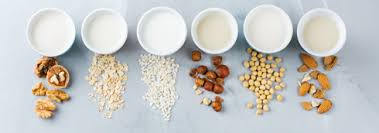
A recent study has been conducted in Australia on plant-based drinks: the research focused on over 100 types of drinks sold in the main grocery stores. Examined products came from different sources: nuts, seeds, legumes, coconut, grains and a smaller part from mixed sources. Around 57% of analyzed drink was fortified by adding various nutrients.
The outcomes highlight how, compared to the cow milk, plant-based drink lack in several micronutrients, including Vitamin A and B12, calcium, proteins and zinc.
The finding was defined ‘disconcerting’ by researchers since consumers wrongly think of plant based ‘milk’ as a rich and complete product.
Vitamin B12, was little to zero in all products, while, in the cow milk, the vitamin content is between 0,5-0,8 g/100 ml. Also the protein content, excepted for the mixed-sourced “milk”, was found very low in most of the references.
None of the examined products was fortified with zinc or iodine and just one-third only had a calcium content similar to the cow milk.
Perhaps, the only positive aspect was represented by the low sugar content (1,1- 3,7 g/100 ml).
A further analysis was carried out in order to understand how cow milk substitution with plant-based milk could affect the protein intake in adolescents aged 12-18 and women over 50 years old.
As known, adolescents and women over 50 are considered the most ‘sensitive’ groups of population, since they need more micro nutrients intake. Indeed, both categories have specific needs, for bone health, just to name one.
For adolescents, cow milk fulfil 64% to 90% of their Estimated Average Requirements (EAR) of protein intake.
Consuming plant-based drinks instead, meets 23% only for drinks sourced from cereals, seeds or nuts, while the ‘milk’ from legumes can cover between 55 and 78%.
The same trend was observed for women over 50 and, regarding the calcium, it was 98% of the recommended intake for both thanks to the fortification of drinks.
In conclusion, the research showed that cow milk is a crucial source of proteins, calcium and zinc with over 50% of the recommended daily intake for both groups of population analyzed.
However, substituting cow milk with plant-pleased sources can be worth when fortification given offers the necessary micronutrients intake.
Our represented companies offer a wide range of products for the ‘fortification’:
Cosucra (site) from Belgium, apart from inulin and FOS from chicory, produces isolated pea proteins and pea fibres.
Lipofoods (site), a Spanish company, offers both micro incapsulated minerals and botanical extracts, such as iron, calcium, zinc, magnesium, curcumin, caffeine and phytosterols.
Divi’s (site), instead, offers vitamins and colorants for food and dietetic sector (Beta-Carotene, Licopene, Lutein, Vitamin A, D2 and D3).
The French company Nuwen (site) offers a wide range of micro and macro algae.
Don’t hesitate to contact us (link) for further information.
News Archive
